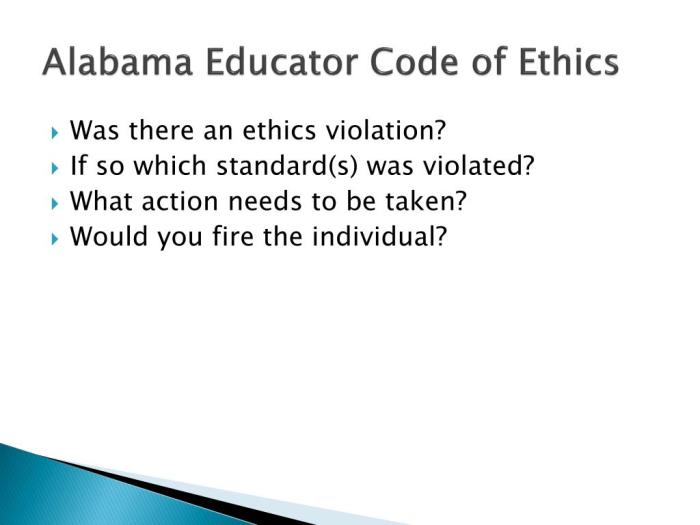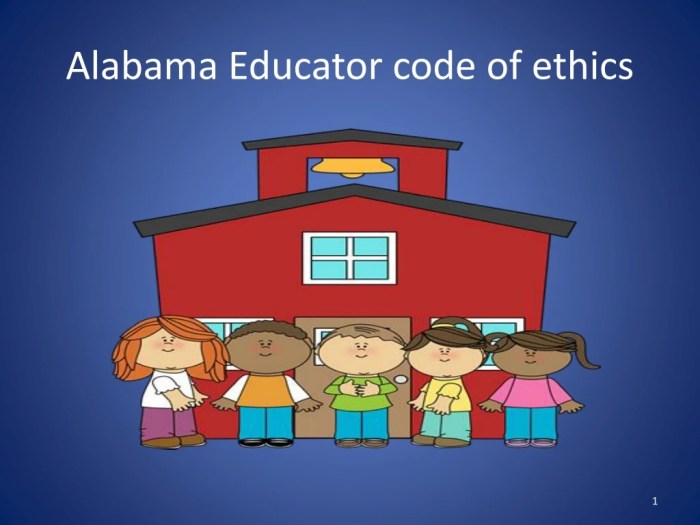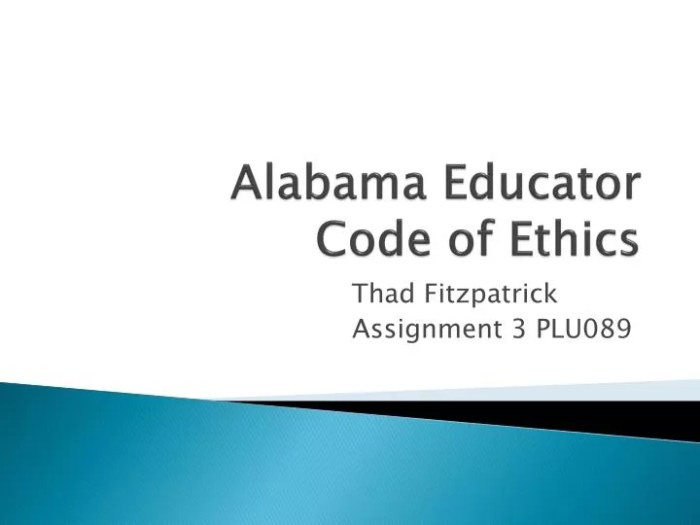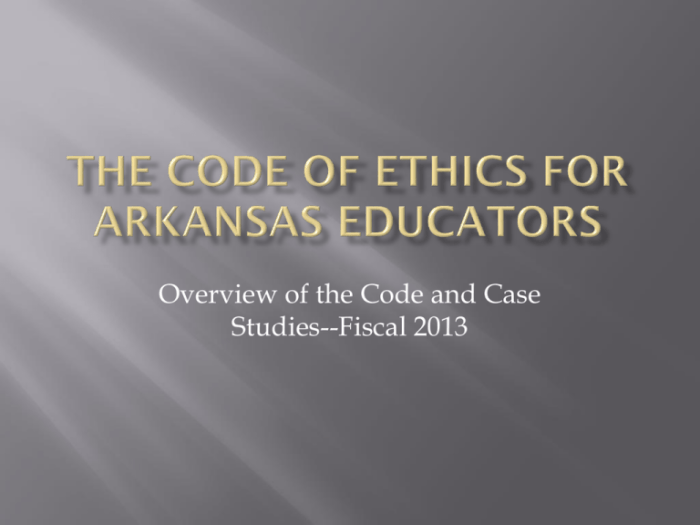Step into the realm of the Alabama Educator Code of Ethics, a beacon of ethical conduct that shapes the educational landscape of Alabama. This comprehensive guide empowers educators with the principles, responsibilities, and decision-making frameworks essential for navigating the complexities of the profession.
From the fundamental principles that guide ethical behavior to the practical considerations of professional responsibilities, the Alabama Educator Code of Ethics provides a roadmap for educators to uphold the highest standards of conduct. Its relevance extends beyond Alabama’s borders, serving as a valuable resource for educators nationwide.
Principles of the Alabama Educator Code of Ethics

The Alabama Educator Code of Ethics Artikels the fundamental principles that guide ethical conduct for educators in the state. These principles are crucial in ensuring that educators maintain high standards of professionalism, integrity, and accountability.
Adhering to these principles is essential for fostering a positive and ethical learning environment for students. They provide a framework for educators to make responsible decisions, treat students and colleagues with respect, and contribute to the overall well-being of the educational community.
Professionalism
Professionalism encompasses a range of behaviors and attitudes that demonstrate an educator’s commitment to the profession. Educators are expected to:
- Maintain a high level of knowledge and skills in their subject area.
- Continuously seek professional development opportunities to enhance their teaching practices.
- Uphold the reputation of the profession by acting ethically and responsibly.
- Respect the diversity of students, colleagues, and parents.
Integrity
Integrity is a cornerstone of ethical conduct. Educators are expected to:
- Act honestly and transparently in all their dealings.
- Avoid conflicts of interest that could compromise their professional judgment.
- Take responsibility for their actions and decisions.
- Maintain confidentiality of student and colleague information.
Accountability
Accountability ensures that educators are held responsible for their actions and decisions. Educators are expected to:
- Meet the expectations Artikeld in their job descriptions.
- Follow district and state policies and regulations.
- Seek feedback from students, colleagues, and supervisors to improve their teaching practices.
- Be open to constructive criticism and take steps to address areas for improvement.
Professional Responsibilities
Educators hold significant ethical responsibilities towards their students, parents, colleagues, and the community. The Alabama Educator Code of Ethics provides a framework to guide their professional conduct and ensure the highest standards of integrity and professionalism.
Educators must prioritize the well-being and development of their students. This includes fostering a positive and inclusive learning environment, respecting their privacy, and ensuring their academic and social progress. Educators should maintain open communication with parents, keeping them informed about their child’s education and seeking their support in their academic journey.
Responsibilities Towards Colleagues
Educators are expected to collaborate with colleagues to create a supportive and productive work environment. They should treat their fellow educators with respect and maintain confidentiality in matters involving sensitive information. Educators should also contribute to the professional development of their colleagues, sharing knowledge and experiences to enhance the quality of education provided to students.
Responsibilities Towards the Community, Alabama educator code of ethics
Educators have a responsibility to engage with the community and contribute to its well-being. They can participate in community events, volunteer their time, or serve on local boards and committees. By actively participating in the community, educators can build relationships and demonstrate the importance of education beyond the classroom.
Ethical Dilemmas
In the course of their professional responsibilities, educators may encounter ethical dilemmas. The Alabama Educator Code of Ethics provides guidance on how to navigate these situations by considering the principles of ethical behavior and the potential consequences of different actions.
For example, an educator may face a dilemma if a student discloses confidential information. The educator must balance the student’s right to privacy with the need to report any concerns about their safety or well-being. By consulting the code of ethics and seeking advice from colleagues or administrators, educators can make informed decisions that prioritize the best interests of their students.
Ethical Decision-Making

Ethical decision-making is a crucial skill for educators, as they are responsible for the well-being and education of students. Ethical decision-making involves making choices that align with moral principles and professional standards. It requires careful consideration of the potential consequences of one’s actions and the impact on others.
The Alabama Educator Code of Ethics provides guidelines for teachers to maintain professionalism and ethical conduct. If you’re studying for the Mandt Chapter 1-3 test, you can find the answers here . The code of ethics ensures that educators prioritize student well-being, maintain confidentiality, and uphold ethical standards in the classroom and beyond.
Steps Involved in Ethical Decision-Making for Educators
Ethical decision-making for educators typically involves the following steps:
-
-*Identify the ethical issue
Determine the nature of the ethical dilemma and the relevant ethical principles involved.
-*Gather relevant information
Collect information about the situation, including the perspectives of those affected.
-*Consider ethical principles and professional standards
Apply relevant ethical principles and professional standards to the situation.
-*Identify and evaluate options
Explore and assess potential courses of action, considering their ethical implications and potential consequences.
-*Make a decision
Choose the course of action that best aligns with ethical principles, professional standards, and personal values.
-*Reflect on the decision
Evaluate the decision and its outcomes, considering whether it was the most ethical choice and if there are any lessons learned for future decision-making.
Role of Ethical Principles, Professional Standards, and Personal Values in Decision-Making
Ethical principles provide a foundation for ethical decision-making by outlining fundamental moral values. Professional standards establish specific guidelines for ethical behavior within a particular profession. Personal values reflect an individual’s beliefs and priorities, which can influence their ethical decision-making.When making ethical decisions, educators should consider the following:
-
-*Ethical principles
Respect for autonomy, beneficence, non-maleficence, and justice.
-*Professional standards
Codes of ethics and conduct established by professional organizations.
-*Personal values
Beliefs, priorities, and moral compass that guide an individual’s actions.
By considering these factors, educators can make informed ethical decisions that align with their professional responsibilities and personal values.
Consequences of Unethical Conduct

Unethical behavior by educators can have severe consequences, including professional sanctions, legal implications, and damage to reputation. Professional sanctions may include suspension, revocation of teaching license, or termination of employment. Legal implications could range from fines to imprisonment, depending on the severity of the misconduct.
Damage to reputation can be irreparable, leading to loss of trust and respect from colleagues, students, and the community.
Case Studies
Case 1:A teacher was found to have engaged in inappropriate relationships with students. The teacher’s teaching license was revoked, and they faced criminal charges. Case 2:A principal was accused of misusing school funds. An investigation revealed that the principal had used the funds for personal expenses.
The principal was suspended and later resigned from their position.These cases illustrate the serious consequences that can result from unethical conduct by educators. It is crucial for educators to adhere to ethical standards to maintain the integrity of the profession and protect the well-being of students.
Reporting and Addressing Ethical Violations

In Alabama, educators have a professional and legal obligation to report and address ethical violations. This includes violations committed by colleagues, students, or administrators.
The Alabama State Board of Education (ALSDE) has established procedures for reporting and investigating ethical violations. These procedures are Artikeld in the Alabama Administrative Code (AAC) and the Alabama Educator Code of Ethics.
Reporting Violations
Educators who witness or have knowledge of an ethical violation are required to report it to their administrator or the ALSDE. The report should be made in writing and should include the following information:
- The nature of the violation
- The date and time of the violation
- The names of the individuals involved
- Any witnesses to the violation
- Any evidence that supports the allegation
Investigating Violations
The administrator or ALSDE will investigate the reported violation. The investigation will include interviews with the individuals involved, witnesses, and a review of any evidence.
If the investigation finds that an ethical violation has occurred, the administrator or ALSDE will take appropriate disciplinary action. This action may include a reprimand, suspension, or termination of employment.
Role of Administrators, Colleagues, and Professional Organizations
Administrators, colleagues, and professional organizations play an important role in upholding ethical standards in education.
- Administratorsare responsible for creating a school culture that values ethical behavior. They should provide training on ethical standards and should create a system for reporting and investigating ethical violations.
- Colleagueshave a responsibility to support each other in maintaining ethical standards. They should speak up if they see a colleague engaging in unethical behavior.
- Professional organizationscan provide support and guidance to educators on ethical issues. They can also advocate for ethical policies and practices.
Professional Development and Ethical Growth

Maintaining ethical competence is crucial for educators. Ongoing professional development helps educators stay abreast of ethical standards and best practices, ensuring they uphold their ethical obligations.
Ethical self-reflection and improvement can be fostered through:
Resources and Strategies
- Attending workshops and conferences on ethics in education.
- Participating in online courses or webinars on ethical decision-making.
- Reading books and articles on ethical issues in education.
- Engaging in reflective practice and self-assessment of ethical behavior.
- Seeking guidance from mentors or experienced colleagues on ethical matters.
Comparison to Other Codes of Ethics
The Alabama Educator Code of Ethics aligns with the ethical principles and responsibilities Artikeld in similar codes adopted by other states and national organizations. These codes share common themes of:
- Commitment to student well-being and academic success
- Professionalism and ethical conduct
- Accountability and transparency
However, there may be some variations in specific provisions and language due to the unique contexts and legal frameworks of different jurisdictions.
Similarities
Some notable similarities include:
- Duty to Students:All codes emphasize the educator’s primary responsibility to students, including their safety, well-being, and academic growth.
- Confidentiality:Educators are expected to maintain the confidentiality of student information and protect their privacy.
- Professionalism:Educators are held to high standards of professional conduct, including dress, demeanor, and communication.
Differences
One notable difference is in the area of political activity. The Alabama Educator Code of Ethics prohibits educators from using their official positions to promote political candidates or causes, while some other codes may allow for limited political engagement.
Additionally, there may be variations in the specific procedures for reporting and addressing ethical violations, as well as the consequences for unethical conduct.
Historical Evolution of the Code
The Alabama Educator Code of Ethics has undergone significant evolution since its inception, reflecting societal changes and educational reforms.
Initially developed in the early 20th century, the code focused primarily on maintaining professional conduct and standards of behavior for teachers.
Influences of Societal Changes
- Increased Public Scrutiny:Growing public awareness and expectations of teachers’ ethical conduct led to revisions that emphasized accountability and transparency.
- Changing Student Demographics:The diversification of student populations necessitated revisions to address issues of equity, cultural sensitivity, and inclusion.
- Advancements in Technology:The proliferation of digital technologies raised new ethical considerations, prompting revisions to address online conduct, data privacy, and cyberbullying.
Impact of Educational Reforms
- Teacher Empowerment and Autonomy:Reforms that granted teachers greater autonomy and decision-making authority led to revisions that emphasized professional judgment and ethical decision-making.
- Accountability and Assessment:The implementation of standardized testing and accountability systems influenced revisions that stressed data integrity and ethical use of assessment results.
- Collaboration and Partnerships:Reforms that encouraged collaboration between schools, families, and communities resulted in revisions that emphasized the importance of building and maintaining ethical relationships.
Role of Technology in Ethical Decision-Making
The integration of technology in the education field has introduced a myriad of ethical challenges and considerations that educators must navigate. These challenges include issues related to privacy, equity, and the responsible use of data.
The Alabama Educator Code of Ethics provides guidance to educators in addressing these ethical challenges. The code emphasizes the importance of protecting student privacy, ensuring equitable access to technology, and using data responsibly to support student learning.
Ethical Challenges of Technology in Education
- Privacy:Educators must protect student privacy by ensuring that personal information is collected and used responsibly.
- Equity:Educators must ensure that all students have equitable access to technology and its benefits.
- Data Use:Educators must use data responsibly to support student learning, while also protecting student privacy.
Code of Ethics Guidance on Technology Use
- Principle 1:Educators must act in the best interests of students.
- Principle 2:Educators must protect student privacy.
- Principle 3:Educators must ensure equitable access to education for all students.
- Principle 4:Educators must use data responsibly to support student learning.
Resources for Ethical Educators

Navigating ethical dilemmas in education requires ongoing support and guidance. Here’s a comprehensive list of resources to empower educators in upholding ethical standards:
These resources offer a range of educational materials, workshops, and professional organizations dedicated to promoting ethical conduct among educators.
Online Materials
- National Education Association (NEA) Code of Ethics: https://www.nea.org/code-of-ethics
- American Federation of Teachers (AFT) Code of Ethics: https://www.aft.org/about/policies/code-of-ethics
- National Council of Teachers of Mathematics (NCTM) Principles and Standards for School Mathematics: https://www.nctm.org/Standards-and-Positions/Principles-and-Standards/
Workshops and Training Programs
- NEA Ethical Decision-Making Workshops: https://www.nea.org/professional-excellence/student-engagement/ethics
- AFT Ethics Training for Educators: https://www.aft.org/professional-development/ethics-training-educators
- National Association of Secondary School Principals (NASSP) Ethical Leadership for School Administrators: https://www.nassp.org/professional-development/programs/ethical-leadership-for-school-administrators
Professional Organizations
- NEA Ethics Committee: https://www.nea.org/professional-excellence/student-engagement/ethics/ethics-committee
- AFT Ethics Commission: https://www.aft.org/about/ethics-commission
- Association for Supervision and Curriculum Development (ASCD) Ethics Task Force: https://www.ascd.org/about-ascd/governance/ethics-task-force
FAQ Guide
What are the core principles of the Alabama Educator Code of Ethics?
The Alabama Educator Code of Ethics is founded on principles of integrity, respect, fairness, responsibility, and professionalism.
How can educators address ethical dilemmas within the framework of the code of ethics?
The code of ethics provides a framework for ethical decision-making, guiding educators to consider ethical principles, professional standards, and personal values in navigating dilemmas.
What are the potential consequences of unethical conduct by educators?
Unethical conduct can lead to professional sanctions, legal implications, damage to reputation, and erosion of trust within the educational community.